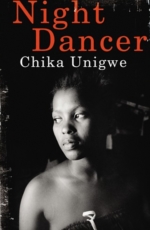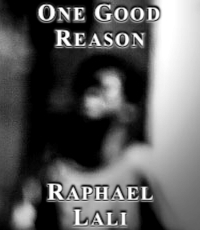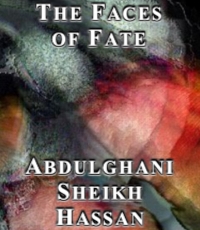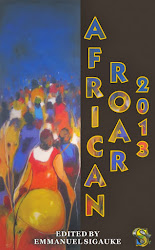Uriah's Vengeance by Masimba Musodza
"I expect you not to have touched anything!" Sergeant Sambiri bellowed ominously, eyeing the corpse as though he expected it to shape-shift into The Swamp Thing at any moment from now and run amok, and he badly needed it to stay dead in order to complete the investigation.
He swung his gaze towards the two detectives, his bulk hiding the clock on the wall so that they could not see that the time was nearly 3 a.m.
The sibling duo exchanged glances. He towered over them, and they both thought his demeanour was reminiscent of Forest Whitaker as Idi Amin in the recent biographical movie.
"Well?" he roared, jolting them to the present.
"Come now, as you can see, Sarge, you still have your stiff," Ce-Ce pointed out. "And a very stiff one it is, too. All we did was witness a murder. What was there to touch?"
He glared at her, as if her guile would literally pop up, the mask of candour that she offered him literally shrivelling under the basilisk power of his eyes.
Susan walked up to them, breaking this deadlock in a battle of wills.
"This looks cut and dry, Sarge," was her verdict, delivered in a matter-of-fact tone that was incongruous with her bimbo expression. She chewed gum for a moment before adding, "We have a body, broken furniture. My guess is that the axe was the weapon."
"No shit, Sherlock!" said Sergeant Sambiri, the placid voice belying his mounting irritation at his subordinates display of stupidity. "And all this time I thought it was something to split the pages of the magazine with!" He wiped his head. "Look, sarcasm aside, she's right. This one's clear-cut. A business tycoon gets attacked by robbers and dies. Two witnesses, hey, might even throw in your earlier report about the attack in the Tilcor area. Clean as a whistle!"
"Aren't you going to try and find the killer?" asked Farai.
"Oh, we'll try," said Sergeant Sambiri, his voice devoid of what Farai and Ce-Ce would have regarded as sufficient levels of enthusiasm and confidence. "But with no fingerprints, a vague description and even vaguer forensic evidence, there’s a very slim chance we will. There’s a better chance of him turning up at the station with a volunteered confession. And he or she was wearing a mask, so our Hammer Horror movie sound effects artist here did not see anything." He cocked his head towards the house-keeper, who sat limply on a sofa and stared in to space.
Farai opened his mouth, but shut it as he felt his sister's hand on his arm. Sergeant Sambiri interpreted this as surrender, and grinned smugly.
"Right, bring in the meat box; get the stiff and this woman out of here. Let's wrap this up, cummon."
He rubbed his hands and began to move towards the door.
"I wonder if they have coffee in the kitchen. Sue, my darling niece, come and make us a cup!"
As dour looking officers perfunctorily seized Karize's limp form to put it in the waiting metal coffin, Ce-Ce pulled Farai aside.
"Should we have one last look around?" she whispered.
Before the police arrived, the detectives had searched the house and found nothing of significance. Farai thought this was to be expected; this wasn’t the main Karize residence, after all. Ce-Ce, on the other hand, felt that with all the clues that kept cropping up, with a murder happening almost as if timed to coincide with their arrival at the house, it was remarkable that they had found none here. Ce-Ce had sifted through the papers on Karize’s desk, and in the drawers in the bedroom. There appeared to be nothing of significance there too, but she took pictures of every page, every scrap of paper. Farai had shaken his head, as if despairing of her folly.
"Well, if you think we'll find something we haven't already," her brother said.
"But we have!" Ce-Ce insisted. "We found nothing of significance!"
"I don't follow," admitted Farai, frowning.
"Well, you should!"
Farai had no choice, for his sister was already marching towards the door, brushing past policemen who gave her no more than a casual glance as if it was, for them, quite mundane to see Rastafarian women walking about at murder scenes. He trotted after her, through to the kitchen and then the back entrance. They stood at the fence, staring at the open space beyond.
"Do you suppose the killer could have wandered through the neighbourhood in that mask without drawing attention, even in the still of the night?" Ce-Ce asked.
"He was lurking in the bushes?" suggested Farai.
"That would have been even more suspicious," Ce-Ce pointed out." A lot of people use those bushes, you know. Lovers who don't have a room. Some kid needing a quiet place to smoke some weed. Maybe someone's grandmother goes there to pray. Or just someone passing who really needs the toilet."
"And with that axe...." Farai pondered the matter some more, before coming to a dead end. He offered his sister a look of defeat, flapping his arms resignedly. "So, how did he get here?"
She looked at him. As if she had transmitted the answer to him telepathically, he suddenly beamed with knowledge.
"He came and left by car."
"Exactly, and these footprints that he left will lead us to where he left it. Come."
With that, she vanished round the corner. Farai trotted after her.
"You were not expecting me to climb over the fence, were you?" she asked, when he caught up with her.
"Is that how he got away, then?" Farai demanded, opening the gate for her.
"No," she replied, enigmatically. "When I got to the kitchen door, the fence was shaking, but I do not think he could have gone up fast enough. I am more inclined to believe he lay low somewhere, and then bolted when we turned our attention to Karize and the housekeeper. Do you have your flashlight, Fa?"
When he said nothing, Ce-Ce glared at him for a moment, then groaned. She produced one from her pocket, a thin little wand with a powerful beam.
"See, footprints," she said, shining the torch on the verge. "Let's go."
Like hound in pursuit of a scent, she was off in to the bushes. All Farai could see was a strobe of light. Beyond the bushes was the main road to Marondera in one direction, and Harare in the other.
"See where the killer trod on plants? He had someone waiting for him on the highway."
She shone her torch around, searching for clues. When they came to the highway, they saw tyre tracks form an arch in to the grass verge.
"I'll take a picture now, but we could come back in early the morning when the light’s better," said Farai. He produced his digital camera. Ce-Ce inclined her head.
"So, you carry a camera, but not a torch?" she asked.
"Can't think of everything every time," he quipped. "That is why there are two of us in this outfit. Shine your torch there, please, my Sis."
That done, they looked around again. However, there did not seem to be anything else noteworthy, so they marched back to the house. They found Sergeant Sambiri and Susan waiting for them at the Audi. Susan was sitting on top of the bonnet but she jumped off quickly under Ce-Ce’s disproving stare.
"Now, what have you two found?" Sergeant Sambiri demanded, more irked by their doggedness than actually curious about what they may have discovered.
"I think we have tracks made by a possible escape vehicle," said Ce-Ce
The cops looked at each other incredulously.
"Is that all?" Sergeant Sambiri snorted disdainfully.
"A lot more than you have, Sarge!" Farai pointed out, flippantly.
"That's because we are not doggedly pursuing the matter!" Sergeant Sambiri retorted.
"You two can play Sherlock Holmes & the Wailers if you like, but we think there's nothing to investigate. We are not going to waste valuable police time, and we certainly lack your sense of drama."
"Don't you think it strange that for a supposedly random robbery, nothing was taken, Sarge?" asked Ce-Ce, before Farai could tell the burly sergeant exactly what other senses he and her sister thought the police force was in want of.
"Not at all. You surprised the robber, so he did not get the chance to get his hands on some loot.”
The Sergeant smiled indulgently.
"Listen, miss, the police have no problem with you carrying on investigating. Snoop around, take swabs for DNA tests, and carry out your deepest fantasies with all that stuff you get off some geek website in the States. For us, this is pretty much open and shut.What I would like you to do is escort us to Ballantyne Park in Harare to Mrs Karize, the deceased’s widow. I think that it would be better if you are present when we inform her of her husband's death."
"Sure," Ce-Ce readily agreed.
"OK. Let's go now," said the sergeant, looking pleased.
He barked a string of last orders to his team, and then joined Susan and another female detective in his powerful Land Cruiser.
As she watched them enter the police vehicle, Ce-Ce started the Audi and pulled out, towards Harare. She winced when she saw the time on the dashboard; nearly 5 a.m. Tamar would be fast asleep now, the poor girl. How she missed her daughter! She cast a sidelong glance at her brother and saw that he was nodding off. She felt wide-awake but she knew that she would go in to some sort of coma as soon as she laid her head on her pillow.
"I think Sambiri suspects the wife," said Ce-Ce. It was more the need to take her mind off Tamar than to keep Farai awake.
"Hm?" Farai sat up, and blinked himself to fully awake.
"I think the police think it was Mrs Karize who did it," said Ce-Ce.
"I thought they were not interested in finding the killer," said Farai.
"No, what Sambiri means is that if the case is too difficult, they are not going to bother. However, if they can scrape together enough to take to the Prosecutor's desk, then they have themselves a high profile case."
"Well, of course," Farai agreed. "And meanwhile, this Uriah chap gets away."
"Don't forget we have a few leads on him," Ce-Ce reminded him. "If the police want to bark up the wrong tree, this could be yet another PR disaster for them, while we will be literally laughing all the way to the bank. It's more imperative that we catch Uriah now than ever."
Farai rolled down his window, allowing in a cold stream of air that blew the sleep from his eyes. Although he felt his physical prowess revive, his mental faculties ebbed. It had been a long day, and a long night, one which had seen the pair of them jump from would-be murder victims to witnesses of a gruesome murder.
"You can take a rest, little bro," he heard his sister say, as though she were far off.
A warm darkness engulfed him slowly, comfortably. His whole being welcomed it, as a long yearned for lover.
Then, suddenly he was wrenched from the dark. He was aware of the drone of a stationary vehicle's engine. Farai sat up with a start. Beside him, his sister was talking to a man peering at them through her window.
"Listen, friend, in a minute the police are coming up behind me," she was saying. "I would just open the gate if I were you. That isn’t what they came for, but if they have to wait at the gate, they may take an interest in that smell of weed in the air."
As if on cue, a powerful light cut an arc across the sheer wall, in to the Audi and the wrought iron gate and then froze. The guard had put a hand to his face to shield it from his glare. Someone was shouting at him in a sharp, commanding tone to open the gate. Muttering a curse, he darted away from the Audi, and retreated into his hut. The gate began to slide open.
They approached the two-storey Spanish-style villa on a cobbled driveway. Lights were coming on all over the house from the top story going down, as if someone was moving from room to room. The front door swung open, Mrs Karize stepped out.
As the detectives emerged from their Audi, she recognized them and rushed towards them.
"Miss Chisango and your brother. My guard said the police were here?"
She looked beyond them, as the police vehicle pulled up. Her eyes held a question as she returned her gaze to the detectives. Sergeant Sambiri stepped out of the vehicle, followed by Susan. He immediately took charge.
"Mrs Karize?" he enquired, gravely.
"Yes?" she whispered anxiously. "What is it? My husband? Tambayi?"
Seeing her worst fears confirmed in Ce-Ce and Farai's eyes, she put her hands on her head and burst in to a high-pitched wail.
Sergeant Sambiri shook his head. "I am very sorry, Mrs Karize," he boomed somberly.
Uriah's Vengeance was written by Masimba Musodza and is an extract from his book Uriah's Vengeance published in February 2009 by The Lion Press.
Copyright Masimba Musodza 2009.

I was born in 1976, as independence and all it offered to an erstwhile disenfranchised Black majority dawned on the country now known as Zimbabwe. I was educated at Avondale Primary School, Harare, and St Mary Magdalene's High School in Nyanga. Then I went to Film School, majoring in Screenwriting and Directing. So, while I am only just emerging in the literary world, I have been a writer for film and television for a while now.
I am the author of The Man who turned into a Rastafarian, an anthology of short-stories. A novel is due to published before the end of the year. I am now working on a ChiShona language novel that I think will push and redefine the boundaries of the genre. I also write essays of interest to adherents of the Rastafarian Faith.



















2 comments:
A fleeting glimpse this extract may be, but Uriah's Vengeance comes off the page speaking volumes.
In the grand tradition of Spillane, Doyle and Chandler, yet entirely unlike them too, this first installment of The Dread Eye Detective Agency, is a fresh and innovative leap forward for the genre. As well as plainly being a cracking good fast paced read.
In all Masimba Musodza never fails to deliver, and Uriah's Vengeance is no exception, and a great step forward toward diverse African Genre Fiction. I can't wait to read the whole book, and have been harassing my local library since February :).
Some great characterization here, Masimba, and a lot of humour. You're managing satire well, without losing the heart of your story.
I haven't read the whole book, of course, but I do think the Sergeant (portrayed as somewhat dense) is a bit stereotypical. This might, of course, be part of your satirical technique, in which case it's fine.
The one other thing I would personally avoid is using modifiers for "said". ("retorted", "snorted", "demanded"). Occasional use is fine, but if you're doing it on every piece of dialog it becomes distracting - that might just be me, of course.
Post a Comment